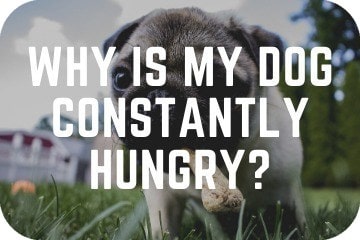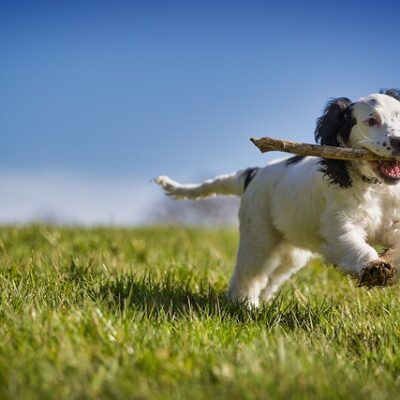Why is my dog constantly hungry? We don’t know exactly why, but there are specific causes which could increase appetite from their DNA to boredom to a health problem. However, there is not always a reason. Some dogs are always hungry, with no explanation.
Busy? Get Your Hands Paws On The Answers Quickly…
- Reasons Why Your Dog May Be Always Hungry
- Breeds That Are Always Hungry
- Signs Your Dog Is Hungry
- FAQs
REASONS WHY YOUR DOG MAY BE ALWAYS HUNGRY

Why is my dog constantly hungry? We don’t know exactly why, but there are specific causes which could increase appetite from their DNA to boredom to a health problem. However, there is not always a reason. Some dogs are always hungry, with no explanation.
Busy? Get Your Hands Paws On The Answers Quickly…
- Reasons Why Your Dog May Be Always Hungry
- Breeds That Are Always Hungry
- Signs Your Dog Is Hungry
- FAQs
REASONS WHY YOUR DOG MAY BE ALWAYS HUNGRY

Medical Reason
The hunger feeling is triggered by hormones sending a message to the central nervous system (CNS). Several conditions can cause this not to function properly. They can include:
- Diabetes: When diabetes is unmedicated or out of control, the body cannot convert the glucose into energy. This can result in higher hunger levels and increased thirst.
- Hyperadrenocorticism (Cushing’s): Cushing’s increases the level of the hormone cortisol. A high level of cortisol in the body stimulates insulin release. When the body cannot regulate insulin, it can result in increased hunger and weight gain.
- Worms: Tapeworms increase the feeling of hunger in a dog. This is because the worms absorb the nutrients from the food, making a dog need more to supplement the loss of nutrients.
- Diarrhea: If your dog has had a bad bout of diarrhea, then they will end up with an empty stomach. Be careful not to go straight back to feeding them their usual food, and your vet will be able to recommend a good alternative, usually chicken or white fish with rice.
- Vomiting: Similarly to diarrhea, vomiting can leave your dog nutrient deficient and therefore increase hunger.
Life Change
Occasionally, if you have had a significant life change, this can affect your dog’s appetite. This can include a house move, death of a family member or other dog, new arrival of a family member or dog, or drastic change in your dog’s routine. This can be stressful and can cause increased appetite or reduce eating.
How to stop this behavior:
- Try to reduce stress or anxiety in your dog’s life by keeping their routine as normal as possible.
- Schedule regular feeding time and stick to it.
Learned Behavior
Every time your dog gives you those puppy-eyes and you reward them with a treat, you reinforce a begging behavior. Your dog knows how to get what they want.
Your dog might not actually be hungry; they just enjoy eating and know how to get the treats they want.
How to stop this behavior:
- Reward on your terms, only treat your dog when they are performing the action you want them to do.
- Do not feed your dog from the table or kitchen if you do not want your dog to beg there.
- Do not give in to their puppy-eyes of begging, if this is not a desirable behavior to you.
Canine Biology
It might just be in their DNA. Their closest relatives, wolves, eat as and when they can. They may eat a large meal when they can and then not again for several days until they catch their next prey.
It is also thought that when dogs were first domesticated, it was done through food. Those that could approach humans and scavenge were then rewarded with more food.
Boredom
You may not have a hungry dog. A bored and unstimulated dog will look for their own entertainment. Sometimes this means scavenging, hunting through bins, eating non-food household items, sticks, and grass (pica), or begging.
When on bed rest, our dog became bored and begged for food far more than usual. When discussing with our veterinarian, they advised it is most likely because they were bored and unable to participate in their routine activities and therefore turned to food for enjoyment.
How to stop this behavior:
- Play with your dog.
- Teach them new tricks.
- Use enrichment activities, check out our 7 easy and cheap enrichment games and how to make a snuffle mat.
- Take more extended, more frequent walks.
- Enroll them in doggy-daycare.
- Use lick-mats or KONG toys which are great for slow feeding, as well as mentally stimulating your dog. Check out our article on the best KONG recipes.
History
If your dog was a stray or came from a shelter, then they have probably had to scavage for food to survive.
Despite now living in a loving home with a regular supply of food, your rescue dog may have these ingrained into their behavior. Therefore, they may continue to scavage or beg, food guard, and eat quickly.
How to stop this behavior:
It can be more difficult with a rescue dog, they have had a troubled time, and you should be understanding of their behavior. These are some tips which have helped us:
- Feed in smaller but more regular intervals, so your dog doesn’t have to go long periods without food.
- Feed in a set routine, so your dog doesn’t get food anxiety and knows when to expect their next meal.
- Use a slow feeder to prevent speed eating.
- Hand-feed (if possible) to help prevent food aggression.
Food Nutrients
If your dog has a low nutrient diet or is not being fed food, which is rich in the minerals they require, then they may feel more hungry. They may feel hunger despite being fed to the correct quantity for their size, activity level, and weight.
Discuss with your vet or local dog supply store which foods which are rich in the right nutrients for your breed.
How to stop this behavior:
- Follow the advice of your vet or nutritionist.
- Feed high-quality food, which is appropriate for the size of your pet.
- Try upping the fiber in their diet.
- Try lowering their carbohydrate intake and upping their protein.
- Feed in smaller, more frequent meals.
Age
As a dog ages, the medication they are prescribed or aliments they may develop with old age may increase their hunger.

Some breeds seem to be hungrier, or greedier than others naturally. Here are our top breeds that always seem to be hungry!
- Beagle
- Pug
- Labrador Retriever
- Golden Retriever
- Dachshund
- Corgi
For all the reasons above, it can be hard to know precisely when dogs are actually hungry and not begging. These are some signs that can show your dog is hungry:
- Constipation
- Inconsistent Stools
- Begging
- Weight Loss
- Lethargy
However, they can also be signs of different medical conditions. Ensure you are feeding your dog at regular times with the right amount of nutritious food.
Why is my senior dog so hungry?
It might be due to the medication they’re on or a particular health condition.
What is Cushing’s disease in a dog?
“Cushing’s syndrome is a condition caused by having too much of a hormone called cortisol in your body. It can be serious if it’s not treated.” https://www.nhs.uk/conditions/cushings-syndrome/
How can I add more fiber to my dog’s diet?
Bran flakes, oats, broccoli, and kale are all good additions to a dog’s diet to up their fiber intake. Alternatively, there are high fibre dog food brands available on the market.
How can you tell if your dog is underfed?
You will be able to tell by their weight and size. An ideal size means you will be able to feel each of your dog’s ribs with light pressure when running your hands down their side, but they have a light layer of fat covering them. When looking at your dog from above, your dog should have an hourglass figure.
How many times a day should a dog eat?
It depends on their age and size. Some dogs with certain health or medical conditions may require a specific schedule, so be guided by your vet or nutritionist.
Puppies at 4 months: 3-4 times per day
Puppies at 6 months: 2-3 times per day
Adult dogs: 1-2 times per day
Looking for more pawsome posts? Check these out…
Why Do Dogs Arch Their Backs?
How To Make A Snuffle Mat
When Do Puppies Lose Their Teeth?
7 Easy Enrichment Activities
Why Do Dogs Age Faster?
Disclaimer: Each dog is different, and every circumstance is different. All efforts have been made to provide accurate information. However, it is not provided by a qualified Veterinarian, Veterinarian Surgeon, or Behaviorist. The information provided is purely educational. The information should not be used as an alternative or substitute for medical care. If you have any health or medical concerns, contact a qualified Veterinary Surgeon or Veterinarian immediately.










No Comment! Be the first one.